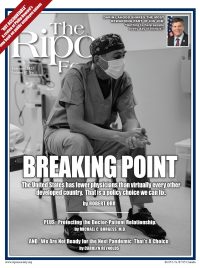
Many health care practices we consider essential are slowly becoming things of the past or recent memory. Frighteningly, the most critical component of our health care system – the doctor and patient relationship – is on the verge of joining this list.
Prior to coming to Congress, I served the moms and babies of North Texas for nearly 30 years. Patients and their doctors should be dictating treatment and care plans that are right for them, not the insurance companies and certainly not the federal government. The doctor-patient relationship is the cornerstone of America’s health care system, and it distinguishes our high-quality care from the rest of the world. To me, this is personal. My dad, a doctor and surgeon, left Canada’s socialized system of medicine to escape the restrictive control over the practice of medicine.
In my meetings with physicians and health care providers, I have heard the unending concerns that our health care system focuses more on the art of paperwork than on time spent with patients. Prior authorization is a process in which a physician gets permission by an insurance company prior to performing a service. This process ensures that physicians are prescribing the most appropriate treatment plan, arguably an important goal. The system’s complexity, however, has added unnecessary layers of bureaucracy that have resulted in lost time, limited resources, and significant delays in care. Policies like prior authorization drive a wedge between doctors using their professional judgment and patients receiving quality care.
In my meetings with physicians and health care providers, I have heard the unending concerns that our health care system focuses more on the art of paperwork than on time spent with patients.
An ingenious idea came to me during a meeting I took last Congress with several Texas physicians who informed me of a new concept known as “gold carding” that the Texas legislature recently passed in the state. This law allows a physician who receives a 90% prior authorization approval rate over a 12-month period for certain services to be granted a “gold card” that would exempt them from prior authorization requirements. The gold card creates a gold standard for doctors: if they’re practicing at a high level of quality, they can cut out the burdensome paperwork.
A recent American Medical Association (AMA) survey found that physicians and staff spent more than 16 hours each week completing prior authorization requirements to get patients necessary medicines, medical services, or essential procedures. On an annual basis, the survey concluded that 853 hours are spent on prior authorization tasks. The likely result is delayed patient care, often for months at a time.
Further, in another survey, the AMA questioned over 1,000 physicians on prior authorization policies, with 79% saying that prior authorization sometimes even leads to treatment abandonment. From personal experience, it is incredibly troubling to me that administrative responsibilities could block patient access to treatment. What is the value of developing a relationship with your patient if the insurance company or the government is going to tell you how to treat your patient? Did they go to medical school?
What is the value of developing a relationship with your patient if the insurance company or the government is going to tell you how to treat your patient? Did they go to medical school?
Fixing the prior authorization process is critical to streamlining efficiency and encouraging value in our health care system. For this reason, I am championing the GOLD CARD Act in the House of Representatives. This legislation would exempt providers who received approval for 90% of their requests in the last 12 months from prior authorization delays for Medicare Advantage beneficiaries. Additionally, the GOLD CARD Act would allow physicians to appeal an attempt by a Medicare Advantage plan to rescind the exemption.
One of the core principles of value-based care is that providers should be rewarded for their quality of care. The concept of rewarding high performance is not new to health care. Adopting a “gold carding” policy would allow our health care system to transition towards a value-based care system while preserving the doctor-patient relationship.
This foundation sets America apart and makes our medical care the best in the world.
Dr. Michael Burgess spent nearly three decades practicing medicine in North Texas before being elected to Congress in 2003. He serves on the House Rules Committee as vice chairman, Energy and Commerce Committee, and Budget Committee.




